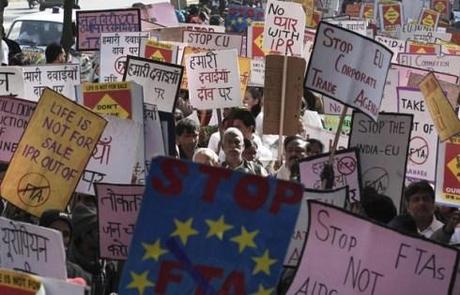from the Asian Human Rights Commission
Several peaceful protests took place in the Northeast states of India over the past month to address concerns over the implications of the EU-FTA with India. Protestors are concerned over the lack of transparency in the Bill, violation of the rights of the indigenous people, and the threat increased imports would make to local businesses and livelihoods. They have also voiced concern over the perceived threat of the agreement favoring large companies and pursuing corporate agendas favorable to multinational EU corporations to the detriment of locals.
An aspect of the proposed FTA includes removing tariffs for 90 percent of agricultural products between the parties, allowing for EU companies to gain access to a market that has been largely controlled by local producers, inhibiting the ability of locals to earn a livelihood, and causing the local agriculture industry to be vulnerable to global volatilities.
Indigenous Indians also voiced concern over the building of the Tipaimukh Dam in Manipur. The building of the proposed dams would cause flooding of huge forest areas and agricultural lands of the indigenous peoples, likely causing displacement of indigenous Indians from their homes.
An additional concern of the proposed EU-FTA agreement is the clause for establishing mineral extraction industries in India. These extractive industries have the potential to inhibit the livelihood of indigenous people in the Northeast, and risk the displacement of the indigenous peoples from their traditionally owned land, as foreign companies are given contracts to the land. Petroleum exploration in Manipur has potential negative ramifications for the indigenous people of the area as well as negative environmental implications. In fact the proposed extraction of petroleum in Manipur has never undergone a satisfactory public consultation.
24 February 2013: In collaboration with the Bianchi Social Care ministry, Senapati, the Maram Khullen Women Society organized a protest in Maram Khullen, Senapati district, Manipur. Over 100 Indians participated in the public consultation turned rally.
The protestors required that the Indian government discuss the agreement in Parliament and State Assemblies before signing it into effect. The protestors furthered their cause to demand that the Indian government respect the rights of indigenous peoples over their own land and resources in the Northeast.
Rally slogans included: “No to lndia-EU FTA” “People have Self-determination Over Land and Resources and Its Management,” “No to Mega Dams,” “Stop Tipairnukh Dam,” “Stop Petroleum Exploration in Manipur,’ “Go Back NHPC,” “Go Back Jubilant Oil and Gas Pvt Ltd,” “Revoke MoU on Tipaimukh Dam,” “Cancel Petroleum Exploration Licences,” “We Want Justice, Equity and Rights Not Exploitation and Profit,” “Free Trade is Not Fair Trade,” “FTAs: Don’t Trade Away Our Freedom,” “FTAs: Don’t Trade Away our Human Rights,” and ” Free Trade is A Deadly Exploitation of the Poor.”
28 February 2013: A public meeting and peaceful protest organized by Partner Villages Development Forumat Chandel took place at Mini Indoor stadium with thousands of persons showing up for the occasion. The demonstration moved from the Mini Indoor stadium to the Office of the Deputy Commissioner. Protestors held signs saying “Free Trade is a deadly Exploitation of the poor”, “FT Free Exploitation of the Poor”, “Stop Chakpi Multi Purpose Project”. The organization handed their memorandum to the Sub Divisional Officer (SDO) as the Deputy Commissioner was out of office at the time of the rally.
The memorandum calls for informed consent of the people before the government ratifies the FTA. It requires that the government refuse the IT provisions of the agreement. Protestors also voiced opposition to proposed construction of Tipaimukh dam in Churachandpur and Chakpi Multi-purpose Project in Chandel district in Manipur and also to stop petroleum exploration in Manipur.
The Chandel specifically cites concerns over the FTA’s intellectual property provisions, which give the TNC power over seeds and biological resources past what is recommend by the WTO. Privatization of agricultural products such as seeds, pesticides, and fertilizers create the potential for monopolies. These provisions negatively impact small farm agriculture and inhibit farmer’s freedoms. Also of concern is that European farm lobbyists, large agribusiness multinationals and the heavily subsidized farms are lobbying for approval of this agreement.
2 March 2013: The Social Upliftment Centre, Thamnapokpi and People Initiative for Development rallied at Thamnapokpi community hall under Moirang district organized a sit in protest and public meeting regarding the EU FTA.
Adam of the Northeast Dialogue Forum said that the group had initiated several protests, rallies, and awareness programs across the Northeastern states regarding the FTA. He stated if “the proposed free trade agreement by India with the EU is signed in March, then the EU will have a hold over our natural and mineral resources,”
The forum issued a memorandum to the prime minister requesting that “existing position and draft proposals of the agreement be made public; the current negotiation on FTA to be discussed and debated in the Parliament and state assembly; to take in prior informed consent of the people before the signing the FTA with the European Union; to stop the proposed construction of the Tipaimukh Dam in Churanchanpur district; to stop the current petroleum exploration in Manipur and the exploitation on Loktak lake and to recognize and respect the right of the indigenous people over their land resources and its management.”

